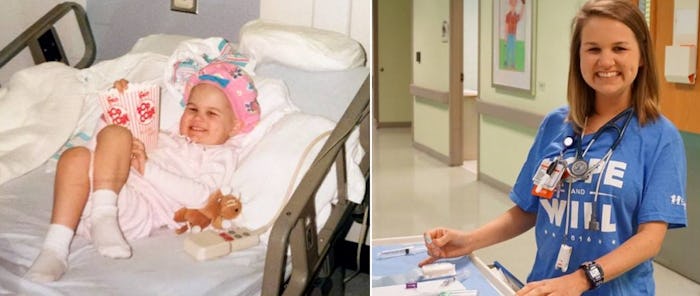News

This Nurse Who Beat Cancer As A Child Is Now Helping Pediatric Patients Just Like Her
By the time Amelia Ballard entered elementary school she'd already beaten cancer. Twice. The Georgia native was diagnosed with acute lymphoblastic leukemia at just 17 months old and spent much of her childhood in the hospital undergoing aggressive cancer treatments. Although she spent countless days and months at Children's Healthcare of Atlanta, even celebrating some birthdays there, she's never grown tired of its hallways or staff. In fact, this cancer survivor is now a nurse treating pediatric patients like her at the same hospital where she once received treatment.
"My earliest memories were with my medical team, specifically my nursing staff and I think it was just ingrained into me," Ballard tells Romper of her desire to become a nurse. "In those early developmental years I was just surrounded by such wonderful doctors and nurses. And so since I was probably 3 years old, I knew I wanted to be a nurse, to be able to relate to families going through similar situations and be able to tell them my story and give them so much hope and really give back to those in need."
While Ballard now works at the bedside of pediatric patients, she's all too familiar with what it feels like to be on the other side of that care. After spiking a high fever at 17 months old, Ballard was rushed to Children's Healthcare of Atlanta where she was diagnosed with a blood and bone marrow cancer known as acute lymphoblastic leukemia. She underwent 27 months of chemotherapy before doctors declared her cancer to be in remission.
But at age 4, roughly four months into her remission, the cancer returned. And this time, it was more aggressive than before and Ballard needed more aggressive treatments, including radiation and a bone marrow transplant.
"I had a lot of complications post transplant," Ballard tells Romper. "That was when my parents said they really were uncertain about the outcome. That was the first time they had really lost a lot of hope."
Slowly, however, Ballard began to get better and soon her cancer was once again in remission. Eventually, Ballard was transferred to the Aflac Survivorship Program at Children's Healthcare of Atlanta where she continued to be seen for follow-up care until she was 18 years old.
"It was like everything truly revolved around the hospital," Ballard says. "It was a little bit bizarre. A lot of my early memories were surrounded by a hospital environment."
But it was that environment and, specifically, the team of medical professionals who cared for her that ultimately inspired Ballard to study nursing at Georgia Southern University.
Shortly after graduating, Ballard was called back to Children's Healthcare of Atlanta in 2016. Except this time, she was there to help treat young patients like her.
In 2018, Ballard settled into a position as a clinical nurse in the sedation clinic at Children's Healthcare of Atlanta's Aflac Cancer and Blood Disorder Center. There, she works with pediatric patients who come in for procedures that require them to be sedated, such as lumbar punctures, bone marrow aspirations, or bone marrow biopsies.
"It is very surreal," Ballard tells Romper of caring for pediatric cancer patients as a cancer survivor herself. "Sometimes I kind of have to take a step back when I really think about my experiences as a patient and how far I've really come. I was once the patient on the bed that I'm taking care of."
Ballard says it hits her hardest when she's caring for a patient who is the same age as she was when she was battling cancer, but that her past gives her a unique ability to really connect with both her patients and their families.
"It definitely helps me connect with the children and the families," Ballard says. "When parents are more distraught, I'm able to share a little bit about my story and tell them, 'you know, I was really young when this happened, but I talked to my mom recently and this is the advice that she gave me and I want to pass it on to you.'"
While the prevalence of childhood cancer is relatively rare compared to cancer in adults, it remains the number one disease killer of children in the United States, according to the American Childhood Cancer Organization. Each year, nearly 16,000 children under the age of 19 are diagnosed with cancer and 20% of those will not survive their battle with the disease.
Cancer programs like the one at Children's Healthcare of Atlanta are dedicated to conducting research and uncovering new forms of treatment. But with limited federal funding allocated for childhood cancer and blood disorders — according to the National Pediatric Cancer Foundation only 4% of federal funding for cancer research goes toward childhood cancer — these hospitals depend on support from donors.
For Ballard — who shared her story with Romper as a powerful reminder about the importance of supporting and investing in cancer research during Childhood Cancer Awareness Month — her work at Children's Healthcare of Atlanta is a way of giving back.
"It helps me remember how thankful I am to be where I am today and how super thankful I am for all the nurses and doctors who took care of me during this time," Ballard says. "I love seeing familiar faces of doctors and nurses that were there when I was being treated. It is just so rewarding to be working alongside them."